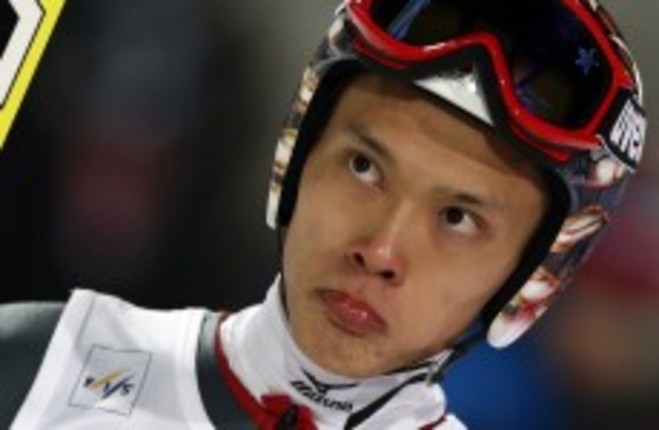IT MAY NOT have been gold but for Japan’s Taku Takeuchi, team ski jumping bronze on Monday was an emotional reward after a severe illness landed him in hospital just weeks before the Olympics.
The 26-year-old complained in January of asthma and returned home early while his teammates continued competing in World Cup events in Europe.
But medical exams turned up a worse-than-expected diagnosis: the ski jumper may be suffering from Churg-Strauss syndrome, an illness with initial symptoms resembling asthma but potentially deadly.
Takeuchi was hospitalised for two weeks and was almost ruled out of the Olympics.
But he fought back and was among the proud Japanese team that took a bronze medal in Rosa Khutor.
“It was a very difficult time for me. I thought I might even die,” said the soft-spoken athlete.
“I thought I wouldn’t even be able to come to these Olympics honestly, but with support from my family and support from people at the hospital, I was able to come,” he said, tearing up, as he spoke to journalists after the competition.
“So many different people helped me… All my seniors (in the team) helped me and I was able to get a medal. I’m really grateful.”
The thought of quitting hardly crossed his mind as he struggled with his illness in hospital.
“When I heard about my disease, I thought about that for a second. But I really wanted to come to the Olympics. That’s what I had in mind the whole time I was hospitalised and my family and everyone who supported me knew that.
“Ordinarily, I probably would have or should have quit.
“But my father encouraged me and said I could do it. My mother was worried but still supported me.
His family’s support kept him focused on the goal ahead, he said through his tears.
“My father enlarged a picture of me standing on the podium when I got second place in Lillehammer (in December) and printed it out. He wrote “Gold” on it and brought it to my hospital room.
“It was an amazing picture, it had a gold medal superimposed on it and looking at that picture I thought I could make it to Sochi.”
Takeuchi said his weight dropped drastically during his illness: “I didn’t look like myself anymore. But I wanted a medal, I had that feeling and that feeling didn’t go away even when I was in hospital.
“I always had a positive mind and that’s how I came to Sochi. I wasn’t in 100 percent form but I always thought how I could perform best without being in the best form.”
Takeuchi’s teammates paid tribute to the young man.
“He clawed his way back to the top, he’s a very strong person,” noted Daiki Ito.
“His family, people around him supported him very well. I was a third party but I could tell… He decided to go and get treated but he said he’d be back in Sochi.”
For veteran Noriaki Kasai, whom Takeuchi described as the person they all looked up to in the team, the illness was another reason to perform on the ski jumping hill on Monday.
“Taku had the most difficult time of all the team members. It chokes me up, I tear up thinking of his sickness, so I really wanted him to get a medal,” he said.
For Takeuchi, this near impossible feat — Japan’s first team ski jumping medal since home Games in 1998 — was cause for hope for more than just himself.
“There are other people who are sick with this disease so if you don’t give up and keep going, you can get a medal: that is the message that I want to give to anybody with that disease,” he added in an impassioned plea.
“I want anyone with this disease to get better.”

